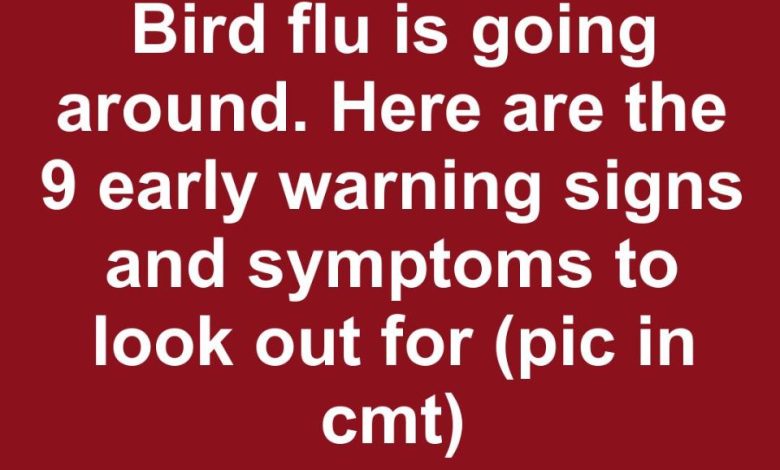Wish I knew about this sooner!

Bird flu, also called avian influenza, is a virus that mostly infects birds. Sometimes, it can also infect humans and other animals. Think of it like a family of viruses, with some being more dangerous than others. Two of the most worrisome types for people are called H5N1 and H7N9. These can make people very sick. Bird flu outbreaks happen all over the world, and they can cause big problems for farmers and businesses because they often have to kill many birds, and they can’t sell them. It’s really important for everyone to understand bird flu and how it could cause a big, worldwide health problem.
The virus spreads mainly when healthy birds or people come into direct contact with sick birds or the fluids that come from them, like saliva, what comes out of their noses, and their poop. It can also spread if you touch things that have the virus on them, like bird cages, clothes, or farm tools. It’s not common for people to give the virus to other people, but it can happen if people are in close contact in certain places. Birds that migrate, or fly long distances, can carry the virus to new areas, which makes it hard to stop it from spreading. One of the best ways to prevent bird flu is to have very strict rules about cleanliness and safety on chicken farms and in places where live birds are sold.
Finding bird flu early is very important. The sooner doctors know someone has it, the better they can treat it, and the less likely it is to spread to other people. It’s also important for health officials to know about cases quickly so they can take steps to stop the spread. People who work with birds, like on chicken farms, or people who are around birds a lot need to know the early signs of the illness.
Bird flu symptoms in people can be mild or very serious, and they often look like the regular flu. It usually takes two to eight days for someone to get sick after they’ve been exposed to the virus. People might have a fever, cough, sore throat, and muscle aches. But if the bird flu is severe, it can cause trouble breathing, stomach problems, and even problems with the brain. Knowing these symptoms early can help people get the medical help they need quickly.
Trouble breathing is one of the main signs of bird flu. If someone has a cough that won’t go away, has trouble breathing, or has chest pain, it could be a sign of infection. In very bad cases, the virus can cause pneumonia or a serious breathing problem called acute respiratory distress syndrome (ARDS). Both of these need immediate medical care. Anyone who has these symptoms, especially if they’ve been around birds or in places where there’s bird flu, should see a doctor right away.
Stomach problems are less common, but they can also happen with bird flu. Someone might feel sick to their stomach, throw up, have diarrhea, or have a stomach ache. These problems can lead to dehydration, which can be dangerous. If someone has these symptoms along with other flu-like symptoms, they should see a doctor to make sure they get the right treatment.
Sometimes, bird flu can affect the brain and nerves. This can cause confusion, seizures, or changes in how someone acts. These symptoms are rare, but they can mean the disease is very serious, and the person needs medical help right away. Brain and nerve problems should never be ignored because they can cause long-term health issues.
A fever is a very common sign of bird flu. It’s often accompanied by extreme tiredness and feeling unwell. A sudden, high fever, especially in someone who has been around birds or in areas where there’s bird flu, should make people think about the possibility of infection. The tiredness can be very strong and might last even after other symptoms get better. Checking your temperature and how much energy you have is important for finding the disease early.
Muscle aches and joint pain are also common with bird flu, and they’re similar to what people feel with other kinds of flu. These symptoms can be mild or very painful, and they can make it hard to do normal activities. If someone has these aches along with other flu-like symptoms, it can help doctors tell the difference between bird flu and other respiratory infections.
Some things make it more likely that someone will get bird flu. These include being around sick birds, going to places where live birds are sold, and working on chicken farms. People with weak immune systems, pregnant women, and young children are more likely to get very sick from bird flu. Knowing these risk factors helps people take the right steps to protect themselves.
It’s very important to see a doctor quickly if you have any bird flu symptoms, especially if you know you’ve been around the virus. Getting medical help early can help prevent serious problems and make it more likely that you’ll recover. People who have serious trouble breathing, a high fever, or brain and nerve problems should go to the emergency room right away. Doctors can do tests to find out if someone has bird flu and start the right treatment.
Preventing bird flu involves good personal hygiene and safety measures on farms and in markets. People should avoid touching sick birds, wash their hands often, and wear protective gear when working with chickens or other birds. Giving chickens vaccines and keeping an eye on bird populations can help control outbreaks. It’s also important for public health officials to teach people how to prevent bird flu.
Bird flu is still a big health concern because it can make people very sick, and it can spread quickly. Knowing the early symptoms is very important so people can get help quickly. By understanding how the virus spreads, knowing the risk factors, and taking steps to prevent it, people and communities can be safer. We need to always be watchful and prepared to deal with bird flu.




